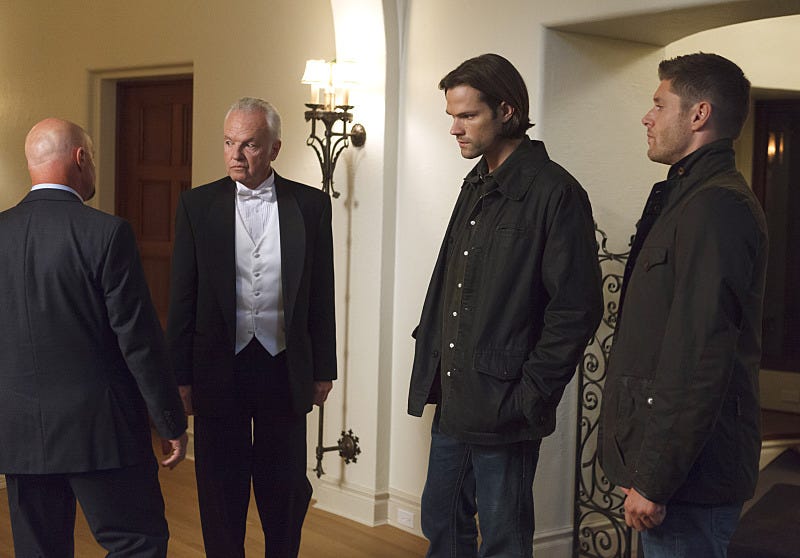6 Questions with Ben Edlund
Live Zoom with The Tick creator this Saturday!
Going Sane
Ben Edlund has “earnest desire to not put crap up on the screen.” He used this phrase the first time he appeared on The Writers Panel way back in 2011, shortly after we worked together on Supernatural. Of course I knew Ben’s work. I grew up in Boston and, on my weekly visits to New England Comics, I always asked about new issues of The Tick.
As Ben said, though, “if you were shopping for it at that time, you would have found that it almost never came up. Over five years, there were twelve issues.”
But what issues they were! Riotously funny, of course, but in a way that wasn’t like the mainstream comedy we’d get on TV. Subversive about superheroes and comic book tropes, but never mean-spirited. Lovingly rendered artwork. An immersive world of heroes and villains and sidekicks. It’s no wonder that The Tick has been adapted three times for television: an animated series ran for three seasons between 1994-1996; a half-hour live action series on Fox that ran in 2001; and a less sitcommy version ran on Amazon Prime for two seasons from 2016-2019.
And here’s the thing: every version of The Tick has been brilliant. Strange and specific and funny and warm-hearted. Each iteration has been different, but all come from Ben’s singular voice.
It’s that warm-heartedness that sets The Tick apart, both from other superhero and genre shows but also from other TV in general. As he told me on that first Writers Panel episode, Ben always keeps in mind that “this is very human business.”
He never forgets the humanity of anyone, whether it’s the people he works with or for, or the characters he writes. I’ve been lucky enough to be in writers’ rooms with Ben, and he is a marvel to watch work. He has this stunning ability to zoom in and out of a concept or pitch, to see the ripples and repercussions of a choice, then reverse time and bring us back to the inflection point. All without ever losing sight of the guiding principle that these are stories about real people. Even on Supernatural, with its emphasis on action and genre, or with any version of The Tick, with its outsized characters, Ben always focused on true emotions.
Ben was frequently asked or allowed to fracture the usual structure of an episode, as in the 2008 Supernatural episode “Monster Movie,” a black-and-white homage to the Universal horror cycle, or the 2004 Angel episode “Smile Time,” in which the title character was turned into a puppet. The reason these episodes work when they come from Ben is because he is able to distill core aspects of the shows themselves. He never loses sight of those aspects, and what makes the characters tick, even as he puts them through the most lunatic paces.


Honestly, even the way that Ben talked about the humans who make up the business exemplifies the inventive and creative way he sees the world. The television industry, he said, is “like a human petri dish of interaction that has a giant weight hanging over it from commerce, like the business side wants to crush it occasionally. Like they turn the microscope too far down, and they crunch the slide.” But even in this crush:
People remember human interaction. They need earnest people who want to create stuff and make stuff that is better than the norm. And when it comes to the very high- pressure activity of making this stuff, it’s like a military operation all the time.
When people are nice, when people are honest, when people bring some humanity into it? You might get a boot heel in the face in a 1984 way. That could happen until the end of time. But odds are, you’ll find other people in the process who really are sincere. And that’s really what makes anything worth watching with occasional frequency.
Ben Edlund is one of those sincere and earnes creative people who conntinues to make things worth watching.
You’ll learn so much about creativity and craft from Ben in our live Zoom Q&A on Saturday at 3pm PT. Link is at the bottom of this newsletter. The only way to join us and ask Ben your questions—or to listen later—is to become a paid subscriber.
6 Questions with Ben Edlund
1. What you working on right now?
I’ve been developing a one-hour sci-fi comedy adventure, technically post-apocalyptic, but I’d say it’s too generally upbeat for that term to be accurate. Also working with partners both on a cartoon for Netflix and independently in pursuit of a VR project exploring narrative in the 360-degree viewer space. Heady yet primordial!
BUT THEN also my band GHOST TYGER & FRIENDS just released their second single “SAND SONG” this past October, plugged here unabashedly:
2. What challenges are you facing specific to your current writing project?
A lot of my recent challenges (those not derived from my own shortcomings) lie in both the long-term inertia of corporations, where deals have taken many, many months to close, and also in those same corporations’ tendency toward unpredictable turbulence and sudden regime change. I’ve had sold pilots dropped because of the latter and still wait today for a deal on a show I sold over a year ago to actually close. This alternating schism of fiscal caution and total abandon grows wearying.
But I think this turbulence is more generally a sign that we are in unprecedented times. The large companies that used to regulate this industry are drowning in new media and unlimited access, really quite lost at sea while we all try to figure out the dominant formats of the next era of entertainment. The field as a whole finds itself in a period of wild flux and opportunity.
3. What advice about the business of TV/film writing can you give to someone starting out now?
A.B.C.: ALWAYS BE CREATING. For someone coming up, there are a lot of ways to be a writer NOW while you pursue a career of TV/film writing in the future.
Online content, gaming and game design, comics, fan fiction and e-books all offer channels of storytelling which can garner an audience and foster the creation of viable IP. The tools to create in these mediums are in most cases readily available. The pressures and hurdles associated with the regular presentation of content in any public medium provide crucial experience for anyone who would subject their writing to the grueling process of TV/film story making.
When I was a kid I used a Super-8 camera and developed my footage at the local drug store on three-minute reels. With my short films I built an audience of dozen (like, one dozen, including neighbors, cast, and family). Then in the late 80s of the previous century I lucked into an opportunity to help produce a small press independent comic book during a brief high point of interest in that fare, a comic called The Tick; that little bit of IP has propelled much of what has been successful in my career. Those efforts built my tool kit and prepared me for some of the psychological rigors of exposing one's interior to the world at large through writing for television.
My years of having obsessed about film and comic creation also gave me the rudiments of storyboarding, shot planning, and visual storytelling I needed to be a central contributor to The Tick animated series, skills honed by the making of many critters whose contour will never see the light of day. I was more or less ready when the opportunity arrived.
4. What advice about the craft of writing can you give to someone starting out?
Get good at getting into character’s shoes. Don’t start a scene with the character at their default settings, just “standing in the foyer,” so to speak.
THEM SHOES ARE WET. They just stepped in out of the rain, after two days of trying fit Tab A into Slot B without any success and that failure has now deeply eroded the labored veneer of their self-image; they’re wet and they see the steam rising off their own clothes in the mud room because their defiantly demented mother won’t turn the thermostat down below eighty! They’re wet and steaming and waiting to make a scene interesting and effortlessly specific.
Keep diving back down for those basics, what the characters are feeling in their bodies, how they’re feeling in their minds, and how all those feelings accrue to drive credible, relatable action and reaction.
A LOT of stories lose people when the actions of the characters in them lose credibility and relatability. SO DON’T DO THAT SHIT.
5. What do you respond to most in a piece of writing?
I suppose it’s work that unlocks spaces in me I didn’t realize were there, spaces of longing, nostalgia, aspiration, anxiety, all the various feels. Those spaces unlock when I’m transported to the point of view of someone else—someone alien to me—but find something of shocking familiarity in that view. Such instances allow for momentary visions of stereoscopic depth.
Good writing can trigger those intimate interactions between writer and reader, an intimacy which can transcend time, space, and sometimes even culture.
6. What are you watching/reading/listening to lately that’s getting you excited or inspired?
I watch a LOT of Youtube these days, TRANSFIXED by the parade of self-expression, creativity, and unintended glimpses into people’s actual lives. The future lies in that continuum of creator/consumers, so I watch it with fascination.
In TV/streaming, where I have worked, amidst a significant volume of chaff, there are more gems than can be counted or viewed.
I LOVE the show Somebody Somewhere by Hannah Boss, Paul Thureen, and Bridget Everett. On the other side of some kind of divide, I binged almost a season of that guy's show Yellowstone on an international flight and must say it was super tight and compellin’. I await that crossover with bated breath.


ALSO I like me some dead trees. Recently read God, Human, Animal, Machine by Meghan O’Gieblyn, a compelling hunt for the sacred in our emerging technosphere; reread Elric of Melnibone: Elric Saga Vol. 1 by Michael Moore, go there if you want the real, original Valyrian dragon riders; and reading now Varieties of Religious Experience by William James. That guy could write his ass off, what a trooper!
If you’re not inspired by these answers to want more from Ben Edlund, then I don’t know what can help you! Join us Saturday, Nov 18, 3pm PT, for the Q&A. Bring your Q’s, Ben will provide the A’s. Link below the paywall.
Keep reading with a 7-day free trial
Subscribe to Re:Writing to keep reading this post and get 7 days of free access to the full post archives.





